Talk to a Registered Dietitian and use INSIDER20 for 20% off!
Talk to a real Dietitian for only $99: Schedule Now
This post contains links through which we may earn a small commission should you make a purchase from a brand. This in no way affects our ability to objectively critique the products and brands we review.
Evidence Based Research To fulfill our commitment to bringing our audience accurate and insightful content, our expert writers and medical reviewers rely on carefully curated research.
Read Our Editorial Policy
To lightly rehash the wording of a particularly popular candy bar ad campaign, you’re not you when you’re thirsty, which is why learning how to hydrate fast does everyone a favor.
Even if you’re someone who doesn’t get cranky when dehydrated, foregoing water for too long can lead to headaches, muscle cramps, tanking blood pressure, about eleventy-five other issues, and, you know, death.
Whether you’ve slept in before the big race or you just want to catch up to full hydration as fast as possible to avoid the bothersome side effects, there’s a right and a wrong way to hydrate quickly and effectively.
This article will explain which fluids (and foods!) to prioritize for optimal hydration, and perhaps as importantly, what not to do when you’re catching up. For safety’s sake, let’s start with the big no-nos of hydrating quickly.
It sounds heavily contradictory at first glance, but water intoxication is not only a thing—it’s a problem that has proven fatal on multiple occasions.
Granted, water intoxication is rare because it requires an extremely high level of water consumption in a short window, but when learning how to hydrate fast, you should keep this precautionary tale in mind.
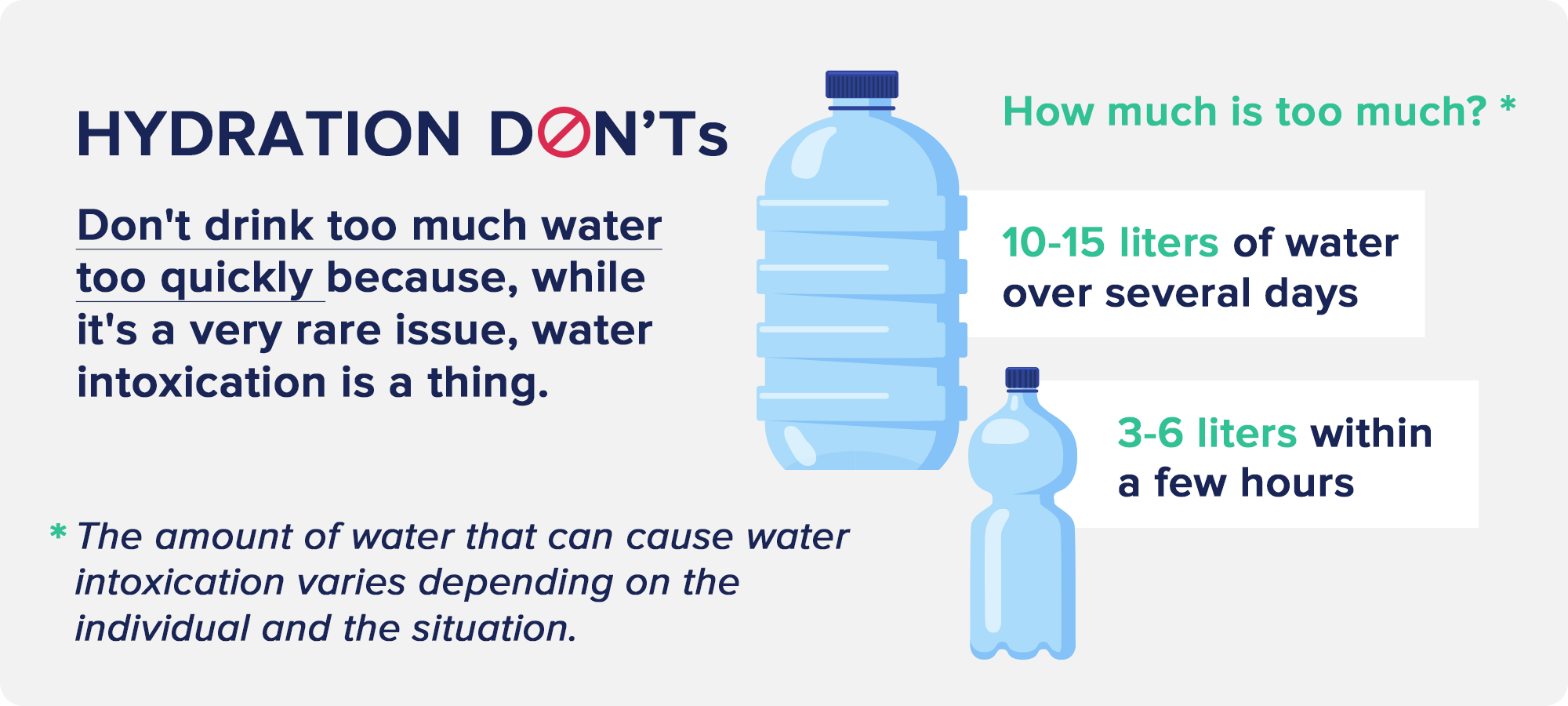
Speaking of, in 2007, a water-drinking contest put on by a Sacramento radio station led to the death of Jennifer Strange, a story that caught national attention for a while.
But how? How can water kill someone?
There’s actually more than one possible mechanism by which an excess of water can be fatal, but the most prevalent cause of death in these cases seems to be hyponatremia, which makes sense.
Hyponatremia is a condition characterized by abnormally low levels of sodium in your blood.
Chugging a lot of water in a short amount of time—especially when you’re significantly dehydrated—can heavily dilute this key electrolyte to the point where it plummets dangerously into deficiency.
This is exactly what happened in this case study from Torbay Hospital in the UK, which described the 64-year-old patient’s cause of death as resulting from a “rapid decrease in serum sodium concentration.”
Of course, hyponatremia is very much treatable with IV fluids (usually water mixed with sodium chloride, aka, salt), but in extreme cases, the electrolyte imbalance causes water to invade brain cells, which is about as good as it sounds.
This can cause serious neurological issues and death.
But how much is too much when learning how to hydrate fast, you may ask?
It varies per person and situation, and the intoxicating effect can accumulate over days or a single episode.
In the first scenario, this study from Japan Journal of Medicine outlines a range of 10 to 15 liters of water intake for “several days” as likely to cause water intoxication.
The estimate for an acute case is very much not nailed down in the research consensus, but most hover around 3-6 liters of water within the stretch of several hours.
Don’t drink too much too quickly—check.
Don’t go overboard on the coffee and/or tea. Before you pen that hate letter (how dated), we said don’t go overboard—you don’t have to abstain altogether.
In fact, many studies say you can have as much as 500mg of caffeine before the diuretic effect (increased urination) of caffeine takes hold.
Alcohol also exerts a diuretic effect, so keep that in mind when trying to stay hydrated.
Also, try to avoid dry, salty, and/or processed foods like chips, crackers, popcorn, and so on when you’re attempting to hydrate quickly.
And hey, many of these foods aren’t so great for you as it is.
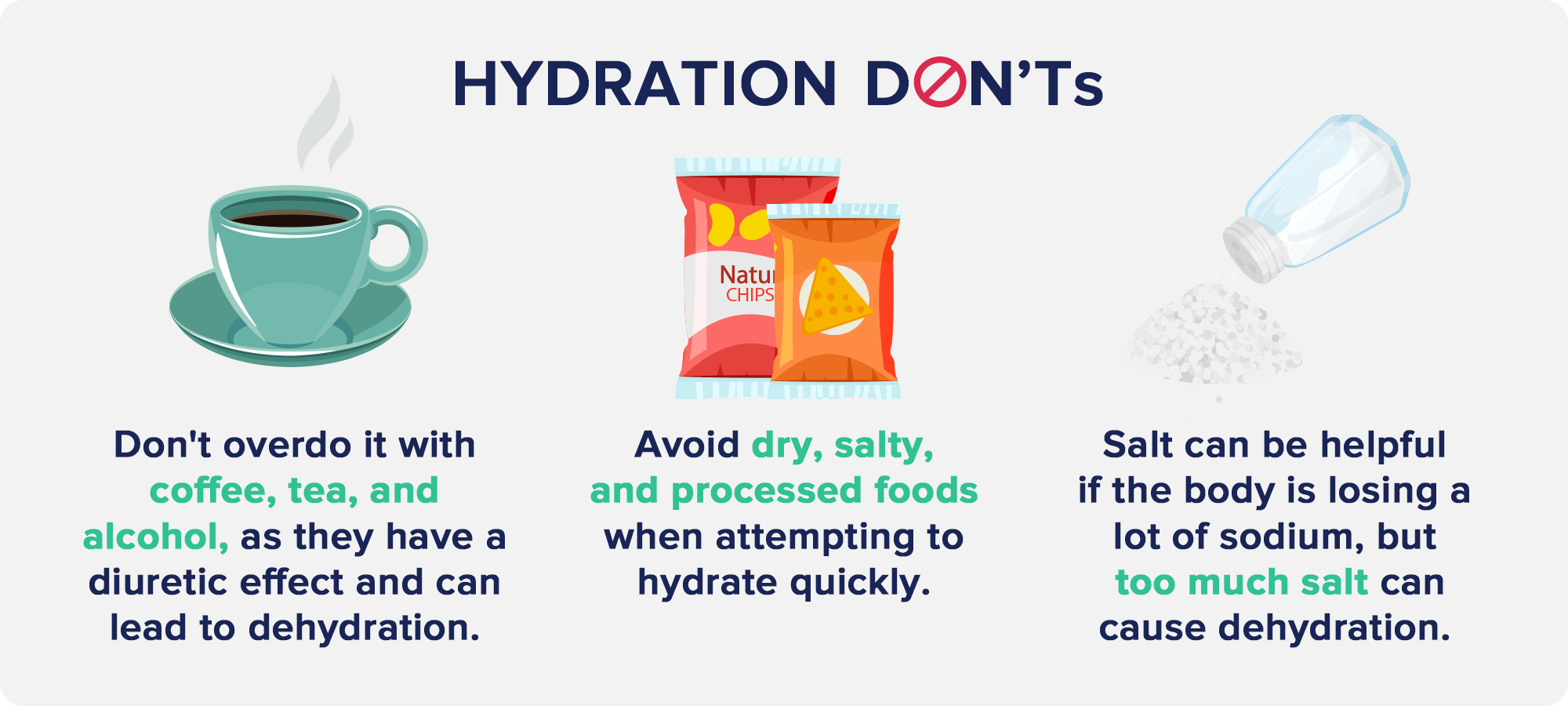
However, we do have a couple key disclaimers on the issue of salt that will hopefully elucidate a bit of the biochemistry behind dehydration for you.
Salt can actually be helpful in preventing dehydration if you’re losing a lot of sodium due to sweat, vomiting, or diarrhea.
However, too much salt when your body isn’t actively (or at least rapidly) being depleted of sodium will tip the scales the other way, causing signs of dehydration and/or other issues.
If the operative word hasn’t outlined itself against the hazy backdrop of sports-drink-sponsored misinformation yet, here it is: balance.
Particularly, electrolyte balance.
That’s quite enough of what you shouldn’t do when learning how to hydrate fast. Let’s get on to effective (rapid) hydration methods.
Obviously, water is the body’s go-to when it comes to hydration, and outperforms many of the most hard-working nutrients out there when it comes to the number of roles it plays in the body.
Especially with all the sports drinks out there (we’ll get to the water vs electrolytes debate in a moment), we tend to think of water as “empty,” or “nothing,” but on the contrary, drinking water throughout the day assists with:
And the list goes on and on and on.
You may remember the old guidelines promoted by health advocates and agencies—drawing hard lines around a range of 11 (women) to about 15 (men) cups of water a day—but the contemporary advice is to gulp when you’re thirsty and sip when you aren’t.
Of course, if you’re way out of the above range, you may not be drinking enough water (or too much).
We’ve already covered what happens if you drink too much too fast, but if you’re one of those people who strongly dislikes the taste of water, you may be suffering from an infected salivary gland (parotitis), gastrointestinal reflux disease, or a medication side effect that causes this issue.
We recommend this succinct breakdown on these issues by Capozzi Dental for anyone who suspects they’re in this boat.
If your distaste of water isn’t related to any of these issues, you can still add lemon, lime, cucumber, berries, and more to enhance the flavor. The sugars will add a bit of a boost hydration-ally(?) speaking.
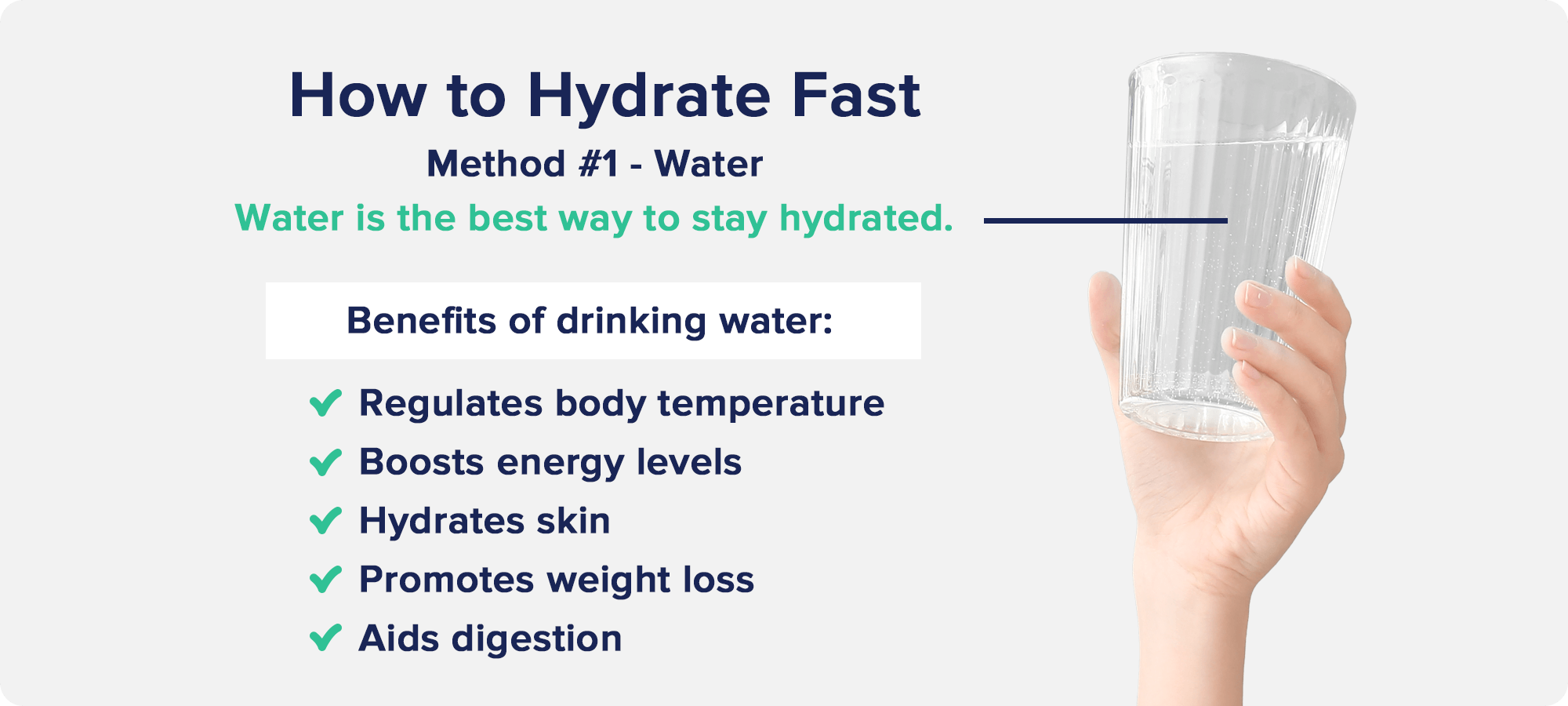
Elephant in the room first: electrolytes are not “more hydrating than water” in an absolute sense.
Like the “salt or no salt” conundrum we discussed earlier, electrolytes (plus water) may be more effective than water alone in some contexts, but not as an inherent property.
To put it very simply, electrolyte-rich water or other fluids may be just what you need if you’re competing athletically, working out, and/or dealing with very hot weather.
In other words, more severe fluid and electrolyte loss often calls for a more robust solution.
These natural, electrolyte-rich drinks can get you feeling back to your old self faster when this is the case:
However, if you haven’t been rapidly losing fluids for whatever reason, you can almost always count on water to meet 100% of your hydration needs.
You can also make your own electrolyte drinks using water, sugar, and salt. Other effective ingredients include citrus fruits (tart cherry juice, lemon juice, orange juice, etc.), coconut water, and more.
Finally, this article on the top electrolyte drinks covers several of the best electrolyte drinks you can buy at the store (and/or online), including Biolyte, Nooma, and more.
Okay, watermelon is a bit of a gimme, but outside of that summertime staple, we tend to forget that many fruits and vegetables contain significant amounts of water.
UCLA Health gives a tidy little summary of the 15 most hydrating foods—sounds funny—complete with water content percentage for each food item.
Oh, and by the way, watermelon sits at number 15!
The top five from the UCLA Health list are cucumber (96% water), iceberg lettuce (96%), celery (95%), radishes (95%), and romaine lettuce (95%).
There are many more fruits and vegetables in the 80s and 90s when it comes to water content, not to mention the fact that you’ll inevitably get some electrolytes in there somewhere, so keep them coming!
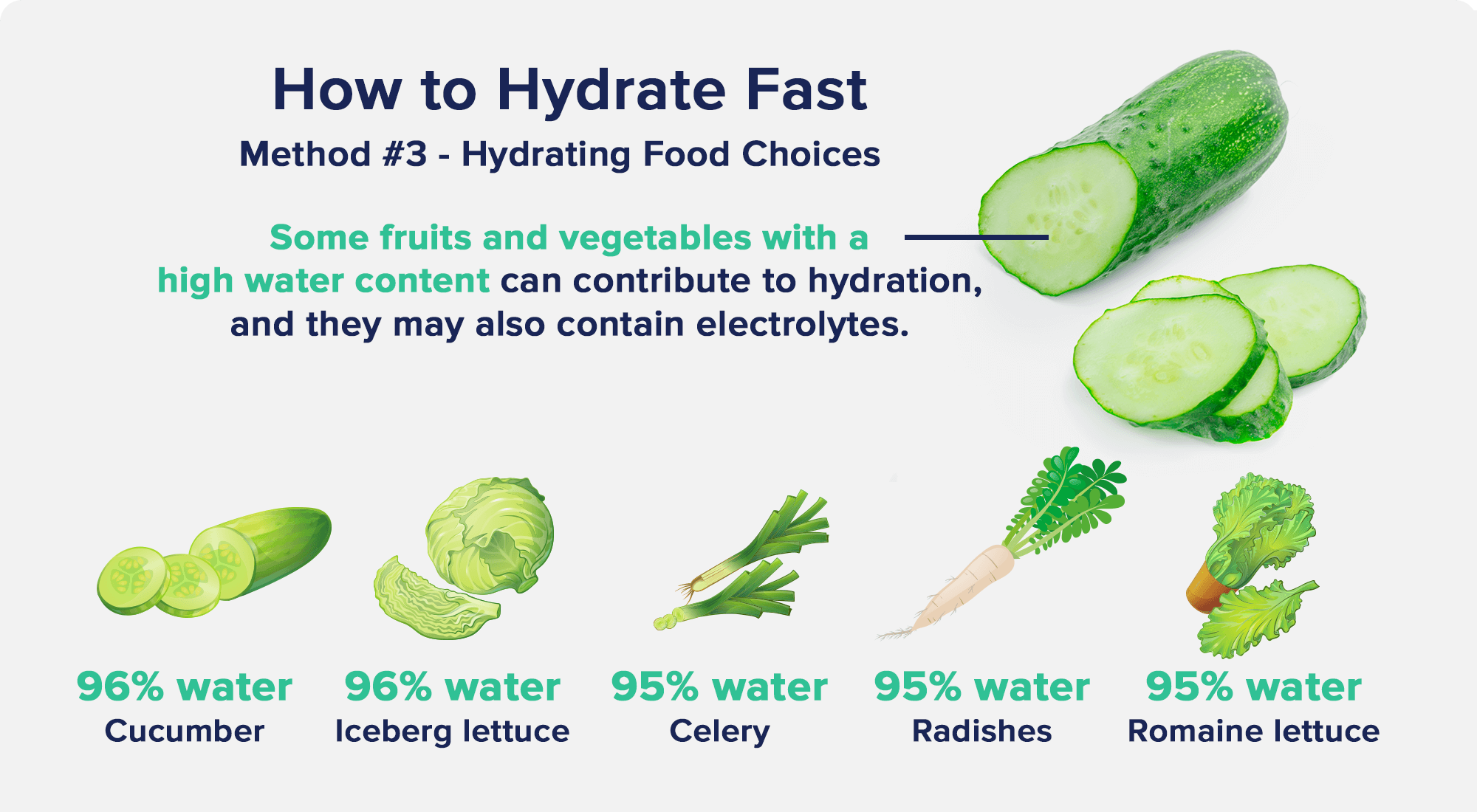
Water is always required to treat dehydration as quickly as possible.
The addition of electrolytes may be necessary and/or effective for people who have lost a significant amount of electrolytes through heavy perspiration, diarrhea, vomiting, or other issues.
Nothing hydrates faster than water, and anyone who claims that natural electrolyte-rich sources like milk, coconut water, etc. can hydrate you faster are ignoring that these are largely made of water.
It’s not a question of “water versus electrolytes,” then, but whether or not you need the addition of electrolytes with your water.
Cases of rapid and/or severe fluid loss (vomiting, diarrhea, profuse sweating, etc.) may necessitate both fluids and electrolytes, not one over the other.
Mild dehydration is usually resolved with plain water.
Within just a few minutes of consuming water, your body will begin putting it to work all the way down to the cellular level, but most sources cite a range of about 45 minutes to 3 hours when it comes to how long it takes the rehydration process to fully run its course.
Of course, this time window can be influenced subtly or dramatically by many factors, including concurrent food intake (usually delays the hydration process), amount of water and rate of consumption, electrolytes, physical activity, and many other factors.
If you need to rehydrate quickly, it’s best to ease up on the strenuous exercise, avoid hot weather conditions, and hold off on large meals.
Dehydration can present itself in many ways, but three of the most common signs and symptoms of dehydration include severe thirst, headache and/or “brain fog,” and dark-tinted urine.
Another clear indication of severe dehydration is a decrease in turgor, a term that describes the elastic properties of the skin.
The pinch test is a simple way of determining whether or not turgor has decreased.
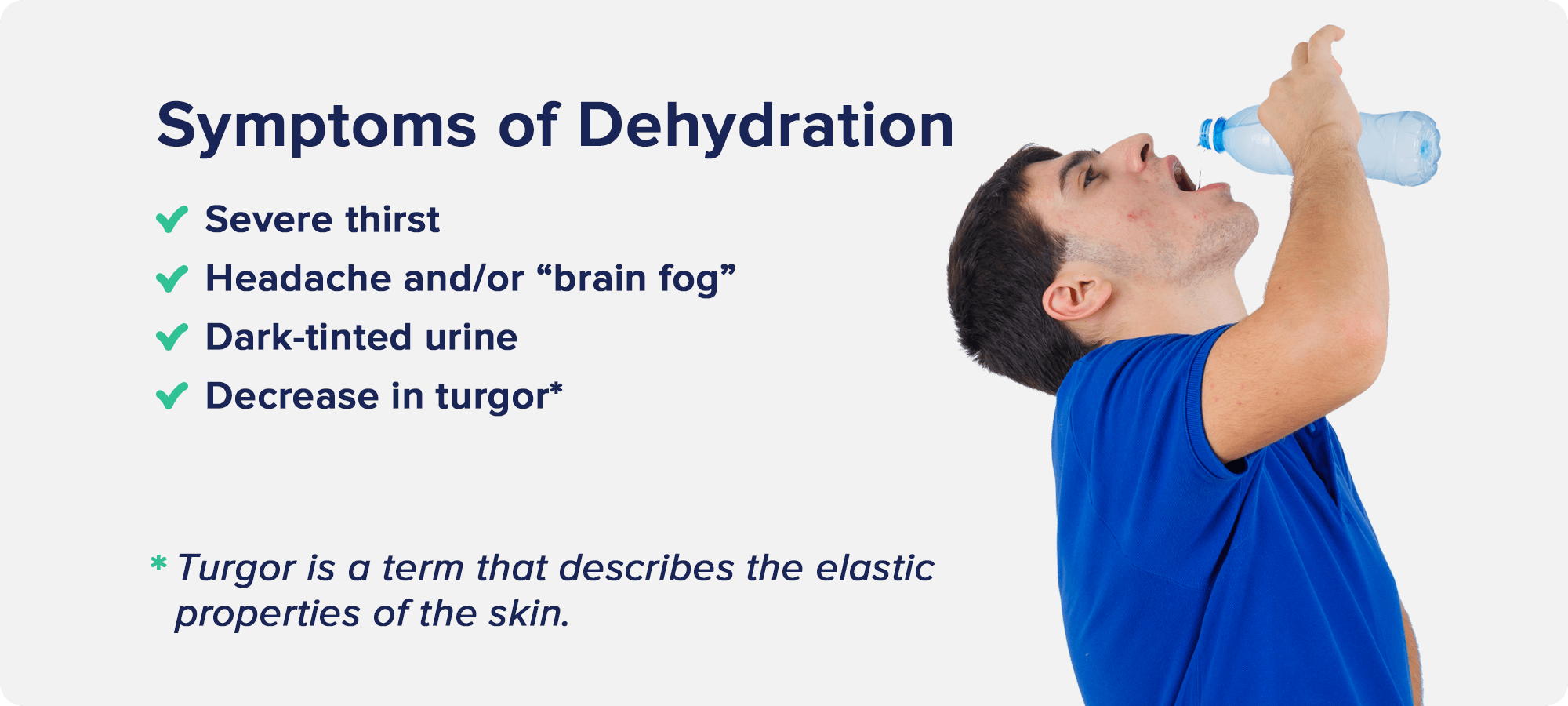
If you drink a reasonable amount of water (less than 2-3 liters) quickly, you are less likely to experience the signs and symptoms of water intoxication and/or hypernatremia.
Any more than this amount, and the ratio of sodium to water in your bloodstream could drop dangerously low, potentially leading to serious neurological issues or even death.
Drinking a comparable amount of an electrolyte beverage may cause similar issues, depending on the ingredients.
Yes, both overhydration and the more extreme case of water intoxication can both occur within a span of a day, or even a few hours.
It all depends on how quickly and just how much water is consumed.
The kidney can only remove water at a rate of up to 1 liter per hour, meaning an extreme amount of water in a short amount of time will cause an excess that can in turn cause very serious electrolyte imbalances.
Generally, chugging is not a recommended practice for those who are already hydrated, but water intoxication is a rare issue that requires an extremely high level of water consumption within a short period of time.
Chugging one or two glasses of water quickly may lead to bloating, discomfort, and increased urination, but it is believed to take at least 3-4 liters before water intoxication becomes a serious possibility.
Especially if you’ve been losing more fluids than usual, it’s okay to help yourself to a large glass/bottle of water or two, but too much too quickly can cause water intoxication.
Hydration isn’t just about water; sodium intake (or lack thereof) is very often the culprit when it comes to dehydration.
Water, electrolyte-rich fluids and products (use in cases of more severe depletion), and foods with high water content are all ideal tools for rapid rehydration.